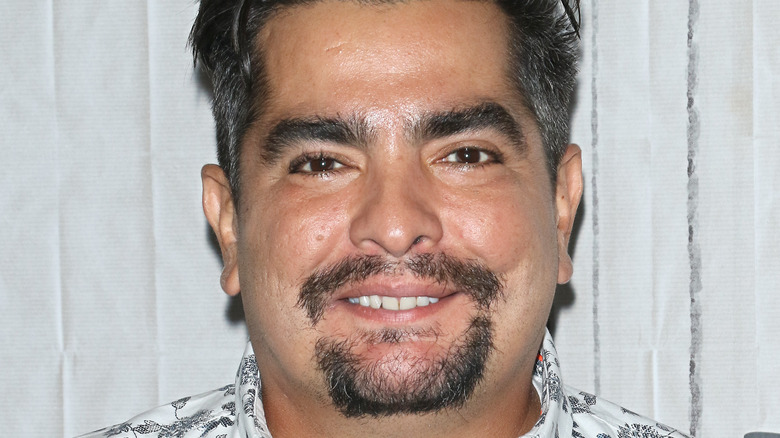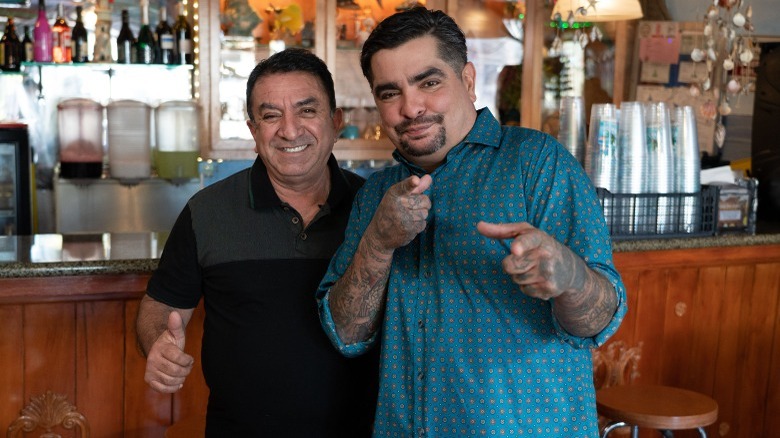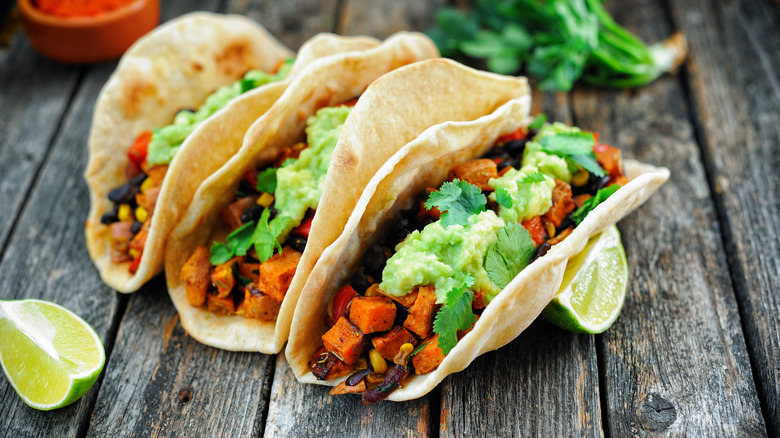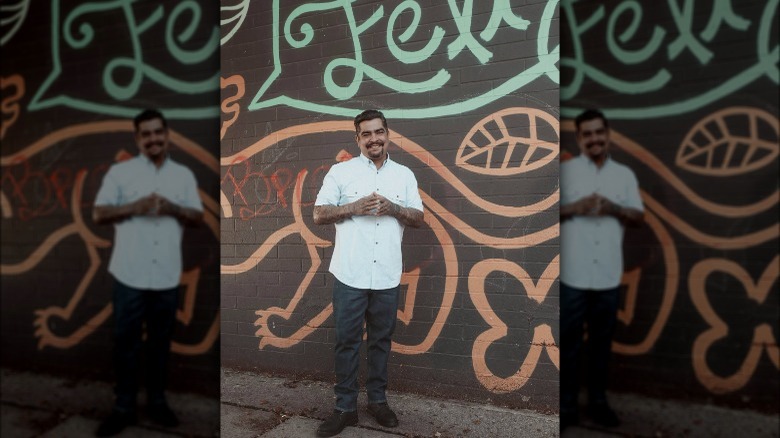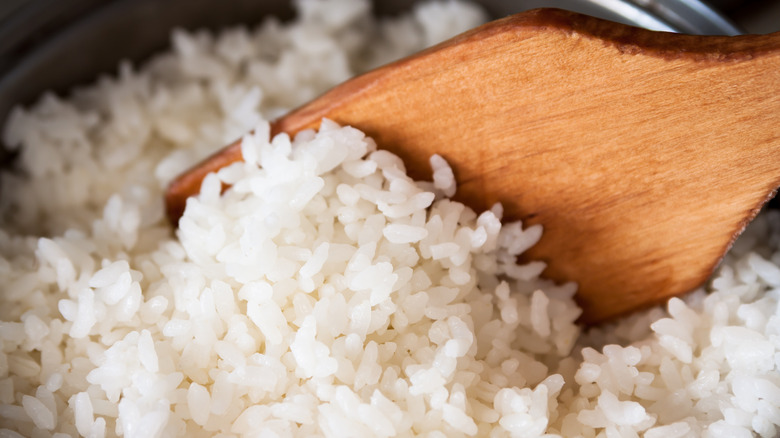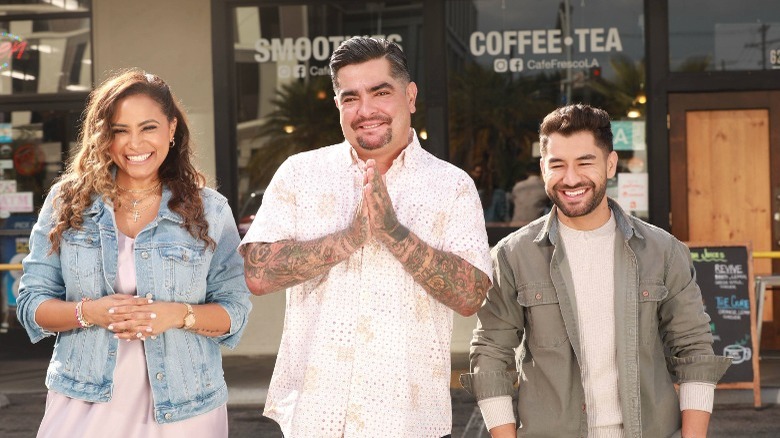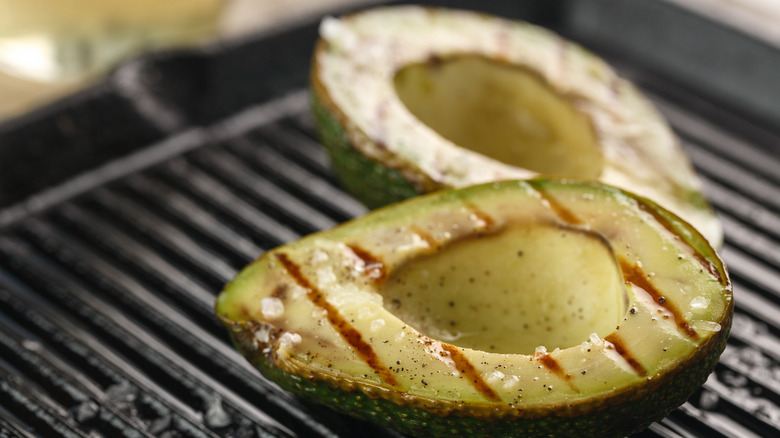Aarón Sanchez's New El Toque De Aarón Series Pays Homage To Diversified Latino Foods - Exclusive Interview
It's time to shine a light on Latino-owned restaurants — and celebrity chef Aarón Sanchez is doing just that. The "MasterChef" judge is the host of the new show "El Toque de Aarón," which showcases Sanchez aiding restaurants in Los Angeles through his culinary tips and famous cuisine. What makes this show unlike any other HGTV adaption, you ask? In an exclusive interview with Mashed, Sanchez explained that the six-episode series celebrates Latino culture with an array of cuisines from a multitude of Spanish-speaking countries (Venezuela, Peru, Ecuador, Mexico, Argentina, etc.).
The Food Network star is known for his two cookbooks, flavorful Latin recipes, and fun TikTok responses to authentic cooking videos (just to name a few). With "El Toque de Aarón" focusing on the thriving California city, Sanchez revealed how he really feels about the Los Angeles taco scene and the underrated culinary methods you should use in the summer months. Pro tip: Don't underestimate the deliciousness of pre-packaged foods!
El Toque de Aarón has a finger on the pulse of Latino restaurants
I want to start by talking about "El Toque de Aarón." What are you hoping the audience gains from watching the show?
Hopefully inspiration, and identifying with that beautiful legacy that family Latino-owned restaurants have and their willingness and their aptitude to want to get better and grow. One of the things we have accomplished beautifully in "El Toque de Aarón" is we are not necessarily telling people they're doing something wrong; we're giving suggestions [on] how to improve and maybe become more contemporary, or maybe update their aesthetic, or look at their menu and say, "Maybe you have too many items" or "Here's a new dish."
It's all about inspiration and support. That's what makes us very different and unique. We're also so community oriented. We're about the neighborhoods. We're about the diversity of all these different Latin cultures that are represented by the six episodes that we are putting forward.
You mentioned community. Do you feel like that theme is what makes the series different from other restaurants that are HGTV related that are already out there?
Absolutely. We were able to identify restaurants that have different obstacles that they're facing. Maybe one restaurant need[s] to update their tables or their chairs or whatever. We have a nice little mix, so it's not the same narrative each time we're helping people. When you think about the celebration of Latino culture, we have it. We're representing Venezuela, Peru, Ecuador, Mexico, Argentina. We have this beautiful array of different restaurants that speak to how beautiful the Latin culture is.
Your focus in the show is Latino restaurants but in Los Angeles. How do you feel about the Latino food scene as a whole in big cities like LA right now?
I think it's ever-changing. Sometimes when there are so many new places opening up and young restaurant operators and chefs are expressing themselves, it's important to go back and remember the iconic institutions and give them love and support. Just because you've been open 20 years, [doesn't mean] you [don't] deserve the same attention that a new restaurant gets.
A big part of what we're doing here is we're putting together this beautiful show for Spanish-speaking Hispanics and Latinos. This is not something that necessarily is going [to] cater [to] an audience from some of these Latin countries that I mentioned before. It's a beautiful opportunity for Latinos rescuing their roots and coming back to the culture and their language most importantly, and then being able to identify with that. I'm a perfect example of that. I'm a bicultural Mexican American that held onto his roots and loved celebrating his culture through food, culture, language, and all those beautiful things. That's what we are excited about.
How to upgrade your taco game
LA is well known for its taco scene. Are there certain ingredients that you can throw into tacos that people may not have thought of or are unique?
LA — I spend so much time here. I live in New Orleans, but LA is my other home.
When you think about the taco and how you dissect it, there's three elements. It's the tortilla, which is the canvas; you have the protein or the filling; and then you have the salsa/garnish. Those three elements need to be working in unison and harmony to create that perfect little bite.
Nowadays, I love the idea of what Roy Choi does with Korean barbecue in a taco format. I love the idea of being able to start using more insects and different kinds of proteins that you can garnish your taco with. That's a really cool opportunity. Then, using more obscure chilies, like fire roasting a yam — putting that in the grill and doing a yam-based taco with a little bit of chorizo and all that yummy stuff.
What kind of insects are you seeing that they throw on?
You have the classic ones, like the grasshoppers in Mexico. You have hormigas, which are ants, which are delicious. You have little grubs, little wormy worms. By the way, people don't realize that when you have some kind of vegan flour or something, a lot of them have insect protein in there. Just throwing that out there.
Your purpose in the show is to mentor other chefs and add a personal touch to each menu item. Is there one dish that stood out to you while filming that you put your own spin on?
Absolutely. We visited a beautiful Venezuelan restaurant. [When] I think of Venezuela, I love the culture and the food. I grew up in New York City, so I was exposed to a beautiful array of different Latino cultures from the Caribbean, Central, South America. When people think about what is [the] diaspora, the canvas of Latino culture, you have Mexico, you have the Caribbean, you have Central America, and you have South America. Spain is not in the conversation because that's something completely different. If you think about it that way, and you think about how to navigate those different cuisines, you're so surprised [at] what you taste and how there are similar elements and completely different at the same time.
We went to this beautiful restaurant in Pasadena called Chamo. This beautiful, very hardworking, tough lady reminds me a lot of my mom, and she has the range of the restaurant. We made a beautiful arepa with Mexican chorizo and a chipotle sauce, and I thought it was a beautiful marriage between using the arepa as the tortilla for [a] taco and using Mexican ingredients. That's a great example.
Don't underestimate pre-packaged foods
Would you have any tips for people who would want to make that at home?
Absolutely. You [have] to seek out the best product possible. If you want arepas, don't be afraid of buying that already made if you're a home cook. Nowadays, we're living in an interesting time where you can get the same quality [from] a pre-packaged situation. It's still awesome — still banging and still awesome. So don't feel the need to always make everything from scratch. Work smarter, not harder.
Seek out those Latino neighborhoods, and go visit with them. In "El Toque de Aarón" on Discovery Familia, we've done a great job of going in there and being community oriented and based. We're celebrating. The [phrase] that I use on "El Toque de Aarón" is "celebration of culture." It's not telling somebody they're doing something bad. It's, "Here's how you can get better."
I actually was talking to a chef a few weeks ago, and he mentioned the pre-packaged tip as well, and he was saying [there's] smoked trout you could grab that's pre-packaged.
Canned beans — they make great ones now. You can saute onions and garlic in a pasote and chile and then make it your own. There's elements that you can already have, let the beans cook, and then you can do your own thing. Feel free to embellish and put your spin. That's one of the things that [is underutilized] because Latinos [are] so prideful about our recipes and our legacies that [if you deviate] from the tradition, you risk pissing off older family members. Put the garlic in there, or the San Marzanos. You put one sprig of basil. You don't go too crazy.
Kitchen hacks and the most difficult part of El Toque de Aarón
While you were sharing your best tips and tricks with other restaurant chefs, are there any kitchen hacks or tips that you actually learned from them?
Absolutely, tons. Out of resourcefulness, if you go to a Caribbean Latin restaurant or some that use plantains, a lot of times you'll see this neat mandolin that's made out of wood, and they're scraping the plantains really thinly.
You see particular kinds of pots that are used only for rice dishes. I always love [them]. I remember learning how to make rice from this Puerto Rican woman, and she told me something really neat. She never measured the ratio of water to rice. She would stir it, and then when the spoon stood up straight, she knew there was enough water to rice. She just added water and then added rice or broth, and once she stirred it and the spoon stood up, that means you're good.
You only had four days to take the restaurant from good to great. What was the most difficult part of the process?
The most difficult part was having these families and restaurant operators and owners relinquish control. Imagine that. At times, the restaurants that we visited have been there for many, many years. This is their calling. This is what they do. So [when we] say, "Give us your keys, I'll see you in four days," everyone was having an emotional breakdown at times. They're like, "Really?" I'm like, "Trust us."
We have a really good team. Cris [Mercado], she's this amazing designer, and Ángel [Riveros], he's a project manager. Everyone is super dedicated to making sure that when they come back and see the new version or the new example of their restaurant, they are pleased to see that we haven't changed too many things and pleased to see how we've updated [it].
It's very Latino in the sense that there's a lot of crying, a lot of direct talking. Some of our operators that we visit will say, "No, I don't want you to change that." I go, "Well, let me help you understand why we want to make a change or why you have too many restaurant menu items." It's this beautiful exchange of conversation and understanding. But as a whole, everyone was super stoked about the new iteration of their business.
Aarón never leaves the restaurants high and dry
Is there a particular moment in the process that threw you a major curveball?
To be very honest, not really, because I've cooked in restaurants my whole life. Part of being a great chef is understanding how to adapt and overcome. There were a couple opportunities where maybe the operator was not happy with the amount of change. Maybe they were expecting something more. But the great thing we do is nurture the process. It's not like we come in, we do our work, and then we leave. We're going to continue to keep tabs on you. We're going to check in with you.
[...] We're not in the business to say no. We say yes, or we'll find a way. That's the whole beautiful part of this. Then, you can keep tabs on the restaurants and on the different episodes that we're featuring. It's this word, "family." It's my business partnership with Warner Bros. You can check out my social media, check out all these different restaurants. There's going to be this beautiful awareness happening. The relationship continues.
So you're keeping tabs on the restaurants still?
Absolutely, because everything is a process. We haven't premiered yet, but we want to make sure that through this process, they're excited about how they're being portrayed, they're excited to continue, whether it's a social media post or whatever it is, so they can continue to get that attention that they deserve. What we want to see at the end, at the core, is we want to see Latino businesses succeed. That's what we want. We'll celebrate Latino culture in the U.S., speaking in Spanish, and having this beautiful moment of first-generation Latinos rescuing their roots and identifying and being proud of where they're from.
Are there any fun behind-the-scenes stories you can share with either restaurateurs that you aided or Cris and Ángel?
First, more so than stories, [there] was this beautiful collaboration between Cris and Ángel. One of the things that I always focus on, and how I think our team has been successful, is surrounding ourselves [with] young, creative people. Ángel is definitely that. Cris is definitely that. It's this idea of being able to have your finger on the pulse of what's relevant. I'm an old-school chef. I like to watch my Discovery Familia, watch my shows, eat, and be with my family, so I'm not always out there. When I'm with young, creative people, it makes me very excited because then I'm learning. I'm seeing what's cool and neat and what's updated. That's what I was really excited about.
Collaboration is so important. I use words like "our." I don't like the word "mine." I don't like to say "my team" or "my ..." People are not objects. We're all in this collectivity together for a single purpose, and that's to be successful and to help others. That kind of wording is very important for me and how we operate.
Get creative with Latino foods in the summer
With summer on the way, do you have any traditional Latino summer recipes that maybe don't get enough attention?
Everyone goes crazy about that Mexican street corn. It's like the avocado toast of this year or the kale Caesar of three years ago. Now, people are fascinated with this bowl culture. "I want a Yucatan bowl," and "I want a Korean barbecue bowl." What is it about the bowl that's getting everybody excited?
As far as what I think would be neat to feature for a summer grilling situation or being out there, don't be afraid to do whole grilled fish with a wonderful dried chile marinade. Then, I love salads with everything, so don't be afraid to grill an avocado. Don't be afraid to grill a beautiful head of cabbage and then shave that and dress that up. Those little things. Don't be afraid to pickle things. Acid is so good. Even when I'm a chef, I get all excited. I start using my hands and stuff.
What kind of white fish do you normally grab?
If I'm grilling, a snapper is awesome. Don't be afraid to score it and then put that marinade in it. Grouper. And don't be afraid to use oily fish like sardines. Be adventurous. Go out there and do it.
All right. I'm definitely going to try those out.
I want to also make mention that we're premiering on April 17, a Monday, on Discovery Familia at 10:00 p.m. Eastern. Also, you can access the show on [the] Discovery Familia GO app, as well as Hogar de HGTV. There's many different ways that you can get this beautiful show, "El Toque de Aarón."
I'm very proud of this project. My partners at Cocina, we produce the content. And [with] our partners over at Discovery Familia, it's been fantastic. Warner Bros. Discovery U.S. Hispanic — the whole market has taken really good care of me, allowing me to create, allowing me to be an executive producer and have fun with it. As a creative chef, you can't put the reins on it. You got to let me go sometimes.
This interview has been edited for clarity.
The 1st episode of "El Toque de Aarón" premieres on Monday, April 17 at 10:00 p.m. ET on Discovery Familia. The series will also be available on Hogar de HGTV on April 19 at 10:30 p.m. ET. Keep up with Aarón Sanchez's latest culinary creations on his Instagram page.
